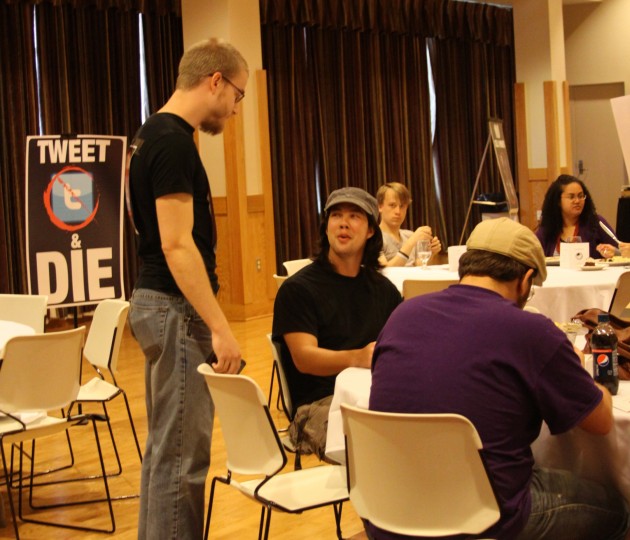
Free food is a special commodity on a university’s campus, and on Friday, April 8, a free lunch was offered to Western Carolina University students. However, in exchange for the nourishment, students had to sign away their First Amendment rights.
The event was called the First Amendment Free Food Festival and was hosted by WCU’s Student Media groups. The festival offered students a perspective of life without their First Amendment rights in the “People’s Republic of Cullowhee”, which was a fake country assembled in the A.K. Hinds University Center’s Grandroom. The motto on the luncheon’s logo stated “Eat free or live free! You can’t do both!”
The First Amendment in the Bill of Rights gives five important freedoms to Americans, the right to free speech, the right to assembly, the right to practice any religion, the right to free press, and the right to petition the government. These freedoms are exercised heavily on a daily basis, and when these freedoms were revoked in exchange for a free lunch, students found out how hard life would be without them.
Three tables were set up displaying three different free lunches. The color of the ticket one received at random as they entered was the color of the sticker on the lunch they would receive. Some lunches resembled fine dining, while the other two were served in boxes, one from Einstein Brothers Bagels, and the other had no name. Drinks were also not an option and were assigned as part of the lunch ticket you received.
Students seemed a bit outraged at first that they could not have the “fancy” lunch or the drink of their choice. Some rolled their eyes and sighed, while others went so far as to complain to the people in charge. Students were quickly reminded that they had no rights, which for some may have been an eye opener.
“I didn’t like being told what to eat and drink but it was free,” said WCU junior Andy Miller, who requested a drink other than Pepsi. “I thought it was very well done and convincing. It was harder than people might think to not be able to use the First Amendment.”
When students walked into the Grandroom for the luncheon, they saw anti-social media posters that mocked websites like YouTube, which was changed to “OurTube.” There were also many tables set up, but some students were not allowed to sit together because they no longer had the right to assemble. Cell phone usage was not allowed because the students gave up their right to free speech.
Any type of negativity towards the luncheon was put down because the participants no longer had the right to petition. Had a student felt the need to complain about the event or what was happening, they were shown an empty comments table. Lunch became paranoid at times as students began to question whether this event was actually legitimate.
There were a few students who believed that the luncheon was quite serious, and a couple actually asked if they were allowed to use the restroom. The environment was further enhanced by students acting for the event, and they were given specific things to perform in order to provide a show. One of the performances included a student involved with the event being asked to stage a talk on his cell phone, and Joseph Moon, acting as “secret police,” removed him from the room and caused a stirring with him in the hallway.
The event prospered according to event organizers because students were enlightened about their First Amendment rights, and how many people take for granted those first five rights given to Americans. Free food is considered to be a marvel in the university community, but the participants of the First Amendment Free Food Festival soon learned that their First Amendment rights are just as vital to their lives as physical nourishment.
(Western Carolinian editor Shelby Harrell contributed to this article.)






